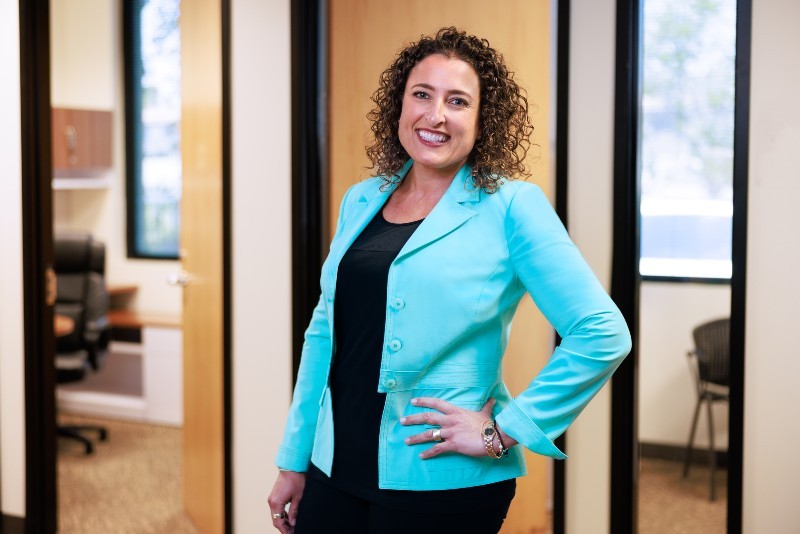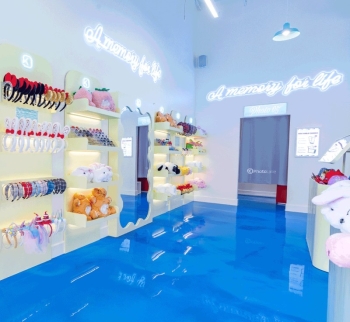Q&A With Bonni Pomush, CEO of Working Wardrobes
Many unemployed individuals need support and services while looking for a job or career. Seeking employment can be demoralizing and confusing. It’s difficult to know where to begin or how to demonstrate skills and abilities to regain job stability.
Since 1990, Orange County-based Working Wardrobes has been helping unemployed people get back to work. They serve nearly 5,000 clients annually through a variety of programs. It’s not just about offering work clothes; their services range from resume creation, skills and personality assessments, interview preparation, job coaching, and certification programs. Yet, they also help candidates dress for success through its Success Suit program. They’ve professionally dressed more than 100,000 people in the past 30 years. They also partner with corporations, educational programs, community agencies, and civic partners to further opportunities and help clients gain confidence so they may be successful in landing their next role.
I was fortunate enough to speak with Working Wardrobes’ CEO Bonni Pomush about the organization’s tailored services that help thousands of people get back to work to earn The Power of a Paycheck™ and learned even more about their empowerment programs.
Greer:
I'm curious, how would someone qualify to use Working Wardrobes’ services? Is it lower income or is open for anyone?
Bonni:
I'm so glad you asked that question, Greer, because most people do not. I like to qualify this as: if you are overcoming a barrier – if there's a barrier between you and gainful employment – we're the right place to come.
Greer:
That’s so great to know and that Working Wardrobes is available to so many. Can you share some examples or scenarios of people who you serve?
Bonni:
I could give you a million different stories, demographics, and things about who comes to Working Wardrobes. The examples of that could be someone who has been out of the workforce for 10 years and is coming back in. It could be a person who has transitioned – maybe they're getting ready to exit the military and coming into the civilian world. It could be while someone is still in jail. We do services literally “in reach” as we call it internally. It could be you're on a college campus, you're a youth who's getting ready to navigate your senior year of high school and you know college is not what's next for you, but you don't know what’s even really possible.
So, I say if you are brave and vulnerable enough to ask for help, there is an outstretched hand here to provide it. And we feel very much like that kind of vulnerability creates a sacred space. It creates a sacred space of humans connecting with each other with different needs and offerings, but both getting out of that interaction.
Greer:
That's beautiful. Does it mean though you must live in Orange County to receive Working Wardrobes services?
Bonni:
As you know too, the pandemic reset all of that, right? Even exacerbating that. We've helped people in Ukraine, we've helped people in Afghanistan. We've helped them on their journeys before and after they've come to the United States. Really, geography is not a barrier. Well, it can be a barrier, but we're overcoming it.
Greer:
I think that some people just think that Working Wardrobes is just all about clothes, but it's so much more than that. Can you explain more about your services?
Bonni:
Most people only know Working Wardrobes because they've been donating their clothes to us, and they know this is the place to donate the good stuff. Most people know Working Wardrobes because they were participating in some sort of clothing drive, whether it was with a network of friends, or a group of some sort of like-minded individuals, or maybe it was at work or with their local Bunko group.
But I think about the clothes as the on-ramp for people to get connected with this mission because when you find out what all those clothes are the gateway to, that internal operating system update is, it's property that stays with people forever. Education is not something you can take out of a person. You put it in, and it stays there. And that's what we're doing.
It's in skills, it's in practice, it's in all of the pieces of preparing for the workforce. So, whether it's a certification or a life skill, whether it's the mock interview or learning just how do I explain this gap on my résumé, it's all of that.
Greer:
That’s so interesting. There’s much more than work apparel that you are offering; I know that personally what a person is wearing can bring confidence and uplift a person’s mood.
I remember at one point when I was younger, mostly a stay-at-home mom, I was feeling down, anxious and a bit depressed, and I went over to my next-door neighbor’s, and she was kind of very harsh with me. I was like, "I don't feel that great. I have so many kids and it’s really hard." And she said, "Girl, you’ve got to get out of your workout clothes. You’ve got to get dressed every day and try to look better. Blow dry your hair, whatever."
And I swear, I think it's true. So, I’ve learned that if you make any effort to look better, dress nicer, it's going to make you feel better overall.
Bonni:
I think you're tapping into a very deep psychological piece which has a great amount of importance. And it's tied in beautifully with the roots of Working Wardrobes – everything you are saying is absolutely true.
The root story of our organization was that our founder Jerri Rosen really wanted to give women who had experienced domestic violence a day where they felt worthy again. And the way that she went about trying to give them that feeling was an external makeover. It was the hair, the makeup and the clothes. And that was the roots of Working Wardrobes became. We want to send people back into a state of worthiness, confidence and like, "You can do it, sister."
And we then found that again, to your point, it goes so much deeper. That the confidence and the ability to exude confidence, yes, in part is these material resources. But it is also this deep-seated belief that we are worthy contributors to the world. I'm super passionate about this because I think that every human is created with some purpose and what a gift it is to find your purpose and give it in the world. It's phenomenal to me.
But this is also what you're describing: a loop. There is the inward loop that happens. In addition to that exterior change feeding the inside, which then feeds the outside, that feeds on the inside.
Greer:
I love that. You're so smart too. I love it. I am curious, how has the recent surge in layoffs impacted the demand for Working Wardrobes' services?
Bonni:
We have yet to see a lack of demand. We could serve more people if we had more money. We continue to increase the number of clients we are able to serve. And our ethos is to always say yes. We don't say no when someone comes seeking help but our limit is how much we have the capacity to help.
The influx and demand has just continued to crescendo since the fire our organization experienced in 2020, and since the pandemic. That fire destroyed everything we had, which was preceded by the shutdown caused by the pandemic six weeks later. So, Working Wardrobes has been in it just a little bit longer than everyone, but that demand continues to increase.
And what's kind of blowing my mind right now is how many people are in need. They may be employed but they’re underemployed and this is really exacerbated by the cost of living in Orange County. You cannot get a job in hospitality, construction or government and make a living wage – to make enough that you are actually able to not just afford what you need, but even save for the future. So, until all of these economic factors are under control. I don't see any end in sight to the demand for our services.
Greer:
I know this through my work at Bracken’s Kitchen. So many people have full-time jobs, but they still can't pay their bills, or they can't feed their families. And it's a really sad and complicated problem. Can you provide me some examples of success stories or individuals who are unsure about re-entering the job market found new hope and stability through your programs?
Bonni:
With pleasure – and you can actually hear some of the voices of our clients on our podcast, Rebuilding Careers. I'm going to talk about one of them because she's on my mind all the time. She's the mother of several children, I want to say four, but it might be three. She escaped a domestic violence situation, moved cross country after having served in our military and came to California with really no safeguards.
We helped her. It's exactly what I was describing before when there's a gap in the résumé. Our team helped her explain that period of time when she served. The military often uses acronyms which need to be translated and she was having difficulty explaining her military occupational specialty to civilians speak. We helped her do that; she was connected with a veteran-friendly employer and they hired her at the place, in a position, that she was so excited to be in: sales and business development. Unfortunately, within a few months into that role, she got a terrible cancer diagnosis, but we were able to help her. We worked closely with her employer to ensure flexibility for her through this treatment time.
I share her story because of its combination to our roots; grounded in domestic violence and addressing the needs of a woman who had left, if you will, the workforce for some time but was able to come back. I also think that our organization can be a bit of the unsung hero for many of our military who receive our services every year and who encapsulate the circle of life and the cycle of living. We serve those who have served. And also because this specific story shows that our clients are not just with us for a moment; sometimes they may be in and out receiving our services.
Another story that I'm thinking about, which we were actually just talking about internally, details how we successfully got a person from not being employed to employed, got them ready for the interview to success, all the things. But then a new barrier arose: they needed to bring steel-toed boots to this new position, a work vest, and a couple of other things. These were items that they did not have the cash in hand to get. After a couple of phone calls to our donation center asking, "Can you find a size X of steel-toed shoes?" We found a pair and pretty soon, their whole work kit was ready. Again, we've overcome another barrier.
Greer:
That’s wonderful that you were able to help these people in different but similar circumstances. I am looking forward to hearing your podcast as well.
Bonni:
What I love about Working Wardrobes is that we have several staff members who have been former clients that now work here. We even have a member of our board is a former client!
I want to repeat what I said before, which is that it's a really sacred space and time to be with people when they are vulnerable. I think we make up stories about these, “other people,” when these are people no different than you and me. We are all humans experiencing life and it’s sacred to be in those personal moments with people on their journeys.
Greer:
With the job market constantly evolving, how does Working Wardrobes ensure that its résumé creation, interview preparation, job coaching services stay relevant and effective for today's job seekers?
Bonni:
At Working Wardrobes, we do a couple of things. One, we have a future of work task force that comes together, and it's informed by a lot of different people from various employers in the HR industry telling us what are the skills they are most seeking that are not necessarily industry specific, but that are transferrable between jobs. This inside data informs us about what workshops we need to make sure to keep relevant.
I'll give you a quick example, which was our last “Future of Work” task force. Hands down customer service is the most in demand skill.
Greer:
Wow. I would not have guessed that.
Bonni:
Why? Because every position requires it. Right?
Greer:
That's true.
Bonni:
It doesn't matter if it's internal or external; you are providing service to your colleagues, to your customers. Because of this we are continuing to offer a national certification in customer service.
Also, as AI has become more front and center with résumé reviews, our HR experts, again, are informing our career coaches about how to hack the system, how to make sure that you have the right keywords and key experiences highlighted in your resume to resonate in a certain way so that you make it through the filter and onto the next review.
I would say it's not a one-time thing, it is a constant conversation. Although we do have particular moments where we say, "Okay, let's gather and convene." When we do that, it’s an added benefit to the experts that are at the table getting to hear what's going on in each other's sectors but also helps inform Working Wardrobes about everything – not industry specific.
Greer:
Thank you for letting me know about the national certification in customer service. That’s so good to know for so many people. I know that your Success Suit program has dressed over 100,000 individuals. Professionally, how does this program contribute to a candidate's confidence and success during interviews, and the job application process?
Bonni:
This external representation of what you have on the inside matters and we do workshops with our clients that we call, “The Power of Your Image.” This workshop teaches people that we have just a finite moment to make a first impression and it takes a whole lot longer to fix a bad first impression. It’s important to really make the most of that opportunity.
What also comes before the "Success Suit” is preparation. Whether it's updating the résumé, filling in these gaps and skills, or having mock interviews – all of that is leading in the direction of preparation so that this person can be prepared for an interviewer’s questions. They can think to themselves: I have thought about these topics. I know how to present myself. I have something of value to contribute to the world. Here's the skill I'm offering to help you fix your problem.
The “Success Suit” at the end is that finishing touch. It's making sure that the outside matches the updated inside, and that the individual feels the confidence that they need. With the updated look, this new confidence is confirmed on the outside and will feed back into their inside. Again, it’s that never-ending loop that's continually feeding itself.
Greer:
Yes, first impressions are so important, and all that you are doing to get to that moment to make a good impression is equally as valuable. Lastly, in addition to individual support, you mentioned partnerships with corporations, or I've heard this, with educational programs, community agencies and civic partners. How do these collaborations expand opportunities for your clients?
Bonni:
We could not do this work alone – it would not be possible. Last year alone, over 30,000 hours of help were donated to Working Wardrobes by almost 3,000 individual people. And those individuals come together in constellations. Sometimes it is through a corporation where someone from that organization is aware of Working Wardrobes and says, "Hey team, let's go do a community service activity together." We call those corporate social responsibility days where it's an opportunity, yes, build your team and do something together but it is also meaningful and makes a positive impact together in the world.
Other times people can't take that model on the road and they need to do something actually in-house. Corporations are really great to partner with for gift cards and clothing drives. Of course, we've talked about the clothing in terms of the “Success Suits,” but our clothing donations that we receive come from individuals and from retailers. And those partners who actually create products, whether it's casual or dressy, if it's ball gowns or swimwear, are cherished. We’re incredibly grateful for the pallets of products that are donated, which is another way that corporations can contribute to our mission of helping people overcome barriers to gainful employment.
Greer:
Got it. That’s so good to know about the partnerships, the gift cards and clothing drives, and all that they can do to help your organization reach even more people.
Bonni:
Yes, the gift card and clothing drives are vital to our work.
I can tell you a client success story where this man, literally, it was the day of the interview, and he did not have enough money to put gas in his tank to make it there. One of our career navigators physically brought him one of these gift cards: a $25 gas card. He was able to put gas in his tank and by four o'clock that afternoon, I was leading a tour in the wardrobing center, and that career navigator came running in and said, "He got the job!"
Greer:
Oh, that is so cool.
Bonni:
And we were all celebrating for this client. From a $25 gift card to an actual job!
Greer:
Oh my goodness. That’s so wonderful.
Bonni:
It was huge. We have corporations that will participate in our job fairs and even do skill building where they'll do a résumé checkup and mock interviews, depending on the expertise of the people volunteering. Our corporate relationships also are incredible, not just as sponsors, but I like to think of it as engaged sponsors. They are hiring our clients, they are providing workshops, they're engaging in volunteer opportunities and they're doing those drives.
We have incredible corporate partners that really are exemplars of, “doing all of the things.” It’s really what I love to see – not just a one-time experience, which has its time and place too – but we really want to build relationships that are tapping into all aspects of the business.
Greer:
How can people find out about Working Wardrobes drives, the wardrobe drives or the gift card, and all of that?
Bonni:
You can create your own wardrobe drive and we'd be happy to help give you the resources to do so. If you’re interested, the best thing would be to email developmentteam@workingwardrobes.org. You can always visit our website workingwardrobes.org and select our “Ways to Help” tab to see how to get involved. It’s there that you’ll find a variety of opportunities.
I would also be remiss in not mentioning our upcoming gala on September 9th, which will be held at the Turnip Rose. If you attend, you'll get to hear directly from one of our clients who will receive a “Quilt of Valor.” It’s a beautiful presentation where one of our partner agencies literally wraps a veteran client in a quilt that was made by people wanting to hold that support and love around our military-connected individuals.
To learn more about Working Wardrobes, please visit workingwardrobes.org.






